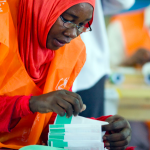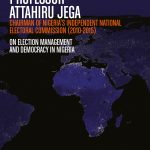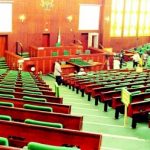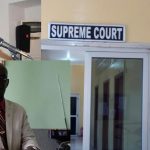Nick Branson, Senior Researcher, was quoted on the absence of policy debates in Zambia’s election campaign and lingering questions over the credibility of a newly-established constitutional court responsible for hearing electoral petitions.
Zambia Goes to the Polls Amid Government Crackdown and Fears of Fraud
Karina Piser Wednesday, Aug. 10, 2016
Lungu was elected in January 2015 following the death of his predecessor, Michael Sata. For many Zambians, Lungu’s admittedly short time in office has left much to be desired, particularly on the the economy. Lungu and his party, the Patriotic Front, are facing mounting criticism from the country’s main opposition movement, the United Party for National Development (UPND), and have cracked down in an attempt to secure a victory in what is likely to be a close race.
Already in 2015, Lungu won with a margin of less than 1 percent, and his time in power has only made him less popular. After last year’s vote, Hakainde Hichilema—Lungu’s opponent then who is again running against him in tomorrow’s ballot—immediately cried foul, accusing Zambia’s electoral commission of fraud. Those allegations have resurfaced this year as Lungu vies for re-election.
The PF’s tightened grip in the lead-up to the election has alarmed observers. While Zambia is situated in a historically embattled region, with chronically unstable Democratic Republic of Congo to its north, Mozambique to its east and Angola to its west, it hasn’t seen the political violence, let alone the civil wars, that have plagued its neighbors. Zambia has even been lauded for democratic elections that twice resulted in a transfer of power to the opposition party.
That relative stability, however, could now be in jeopardy. Lungu has cemented his authority during his time in office, shoring up loyalty he built while previously serving as minister of home affairs, minister of justice and minister of defense. In March, Zambian police arrested Erick Chanda, a major opposition figure, after he accused Lungu of using public funds while on vacation in 2015. UPND members and supporters have been systematically detained for organizing peaceful protests.
The PF has targeted the press, too. In June, authorities shut down Zambia’s largest independent newspaper, The Post, for allegedly not paying taxes, a move that Amnesty International called “a disturbing development clearly designed to silence critical media voices.” Indeed, The Post has recently been considered to be sympathetic to the UPND, and the June shutdown wasn’t the first time the newspaper had been targeted.
The campaign has also gotten violent. After police shot dead an opposition protester in early July, Zambia’s electoral commission temporarily suspended the campaign in two cities, including Lusaka, the capital. The hostile atmosphere has lent itself to finger-pointing, but few observers doubt the PF’s commitment to undermining the opposition. Lungu has reportedly readied his party’s militia to disrupt opposition rallies in the event of a contested election, although he might not need it—he already enjoys the support of the police and security forces given his past ministerial experience.
“Once a bastion of democratic progress in an otherwise tenuous region, Zambia is now traversing a dangerous and altogether inauspicious path.”
It’s worth noting that, although Lungu’s authoritarian tendencies are worrying, they have not necessarily appeared out of the blue. “Since assuming power, successive Patriotic Front governments, beginning with Michael Sata in 2011, have flexed their authoritarian muscles,” says Jeffrey Smith, the executive director of Vanguard Africa, a nonprofit organization that works to promote free and fair elections in Africa. Sata took a particularly hard-line approach to governance, Smith adds, and Zambia’s “downward trajectory has evidently persisted since that time.”
Against that backdrop, few expect a free and fair vote on Aug. 11. The opposition says a rigged election is all but inevitable, pointing to a spate of controversial moves that the ruling party has made to improve its prospects, including the presence of thousands of foreign nationals on the voter registry. Also suspect was the swift implementation of a law granting officials from Zambia’s electoral commission, the majority of which Lungu himself appointed, immunity from prosecution. Lungu has also criminalized any leaking of the commission’s documents and placed new bans on cellphone use at polling stations, undermining the opposition’s ability to report instances of fraud.
“Historically, Zambia has been able to count on the relative independence of its institutions,” says Nick Branson, a senior researcher at the London-based Africa Research Institute. “However, the establishment of a new Constitutional Court—responsible for hearing electoral petitions—has provided the opportunity for executive interference.” And while on Monday, the court ordered Cabinet and provincial ministers to vacate office ahead of Thursday’s vote as required by law, Branson doesn’t see that as a genuine indication that the PF won’t meddle with the election results. If anything, it’s “an attempt to signal to the international community that the Constitutional Court is sufficiently independent to rule against the executive in the event of an electoral petition.” But that’s just window dressing. In fact, the ministers should have vacated their offices back in May when parliament disbanded ahead of elections. So the move “comes far too late in the day to be credible. The damage is already done,” Branson says.
With all that in mind, what’s actually at stake for Zambians? The landlocked country, a major exporter of copper, has been hit hard by falling commodity prices, and Lungu has done little to soften the blow, exacerbating resentment of his leadership and even alienating many of his own supporters. Inflation stood at 21 percent in June, but Lungu rejected an International Monetary Fund package designed to address rising inflation and spiraling debt; in contrast, Hichilema, who has a long track record in business, has vocally supported an IMF bailout. But, Branson notes, neither Lungu nor Hichilema has “spelled out particularly detailed plans, and Zambia’s elections are rarely fought over policy differences.”
The presence of electoral observers is unlikely to level the playing field, either. “Unfortunately, Zambia fits a widespread and more troubling trend in the region insofar as elections are concerned. So long as election day transpires without widespread, brutal and overt violence, the African Union and other regional observers will undoubtedly deem them free, fair and credible,” Smith says. “Once a bastion of democratic progress in an otherwise tenuous region, Zambia is now traversing a dangerous and altogether inauspicious path.”












